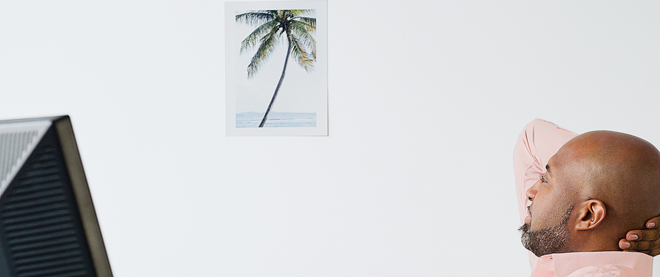Take all the time you want . . .
Unlimited vacations sound like a great perk, but may be a boss’s best weapon to make you work even harder
Share

For tired, overworked employees, it sounds like a dream come true: a job that offers the potential for unrestricted holidays. Forget the era of saving up precious vacation days. Instead, a growing number of companies now offer unlimited time off for their employees. But as the trend catches on, workplace psychologists warn unlimited vacations may not be the unbounded perk they seem.
Over the past few years, more and more companies have cast off the traditional rules surrounding paid leave. That’s partly because the lines between work and personal time have blurred, thanks to mobile computing and other technologies, making it harder for companies to keep track of exactly when and where someone is working. So rather than spell out rigid limits for holidays, the companies are allowing workers themselves to decide how much time to take off, on the condition that employees excel when they’re on the job and meet deadlines. The practice dates back to the 1990s, but gained fame in the last decade when Netflix adopted it. Since then, many smaller social networking companies, as well as law firms and consultancies in the U.S. and U.K., have followed suit, though so far Canadian companies have eschewed the perk.
No doubt workers who have already used up their vacation time and face another five long months before the end of the year are envious, but the unlimited vacation has its drawbacks, say experts. It’s supposed to boost employee morale, but there are concerns it could have the opposite effect. In a new legal paper written for the digital journal Bloomberg Law, Daniel McCoy and Dan Ko Obuhanych of the Silicon Valley law firm Fenwick & West warn that unrestricted time off can actually hurt employee spirits. “Some employees may believe that an unlimited vacation policy is akin to a ‘no vacation’ policy, particularly if the company has a workaholic culture where taking time off is discouraged,” they wrote. “Employees may feel a responsibility to limit the amount of vacation time taken, to fit in with their co-workers and the corporate culture.”
So a novel perk doesn’t always translate into reality. “It can be a good policy on paper, but you have to look at how it’s put into practice,” says Merv Gilbert, an organizational health psychologist in Vancouver. “There can be an implicit expectation that a company has this policy on paper, but it really doesn’t want you to use it.”
While most managers are no doubt wary of offering unrestricted time off out of fear that workers will disappear for months at a time, some experts believe that with open-ended vacations, many workers could end up taking even less time off than they otherwise would. When a company has a set vacation policy, an employee knows exactly how much time off his or her colleagues are permitted to take. In the absence of structured holidays, a race to the bottom may ensue as the realization sets in that the overachiever in the next cubicle hasn’t missed a day of work.
Those types of gnawing mind games are made worse when the job market is in the dumps, as it is in the U.S. All but the most self-assured workers may feel pressure to limit their holidays in order to keep their jobs. “In tough economic times there may be a belief that if I want to get ahead or stay with this company, I’d better not act on [the unlimited vacation offer],” says Gilbert.
Of course, that’s already a problem even when companies do have strict vacation rules. Research has shown that many employees already forego a chunk of their allotted time off. A study by Ipsos-Reid in 2008 determined that Canadian workers neglect to take the equivalent of 41 million vacation days a year that they’re owed. For these workers it’s the equivalent of giving $6.3 billion back to their employers, which is the amount lost in unclaimed paid holidays. Workaholics are the worst at taking time off, says Dr. Barbara Killinger, a psychologist specializing in work addiction. “[Workaholics] see themselves through others’ eyes, so if they are away for long, they worry people won’t see them as hard workers,” she says. In a company with no set rules for vacations, workaholics, who make up 30 to 35 per cent of the North American workforce, are more likely to succumb to their paranoia and may in fact take even less time off. Killinger says unlimited holidays may also be a way for companies to save money, since they would not have to pay out for unused vacation time.
Experts stop short of saying the unlimited vacation perk is an attempt at reverse psychology, but few bosses are likely to be upset if their underlings opt to put in more time at work as a result.